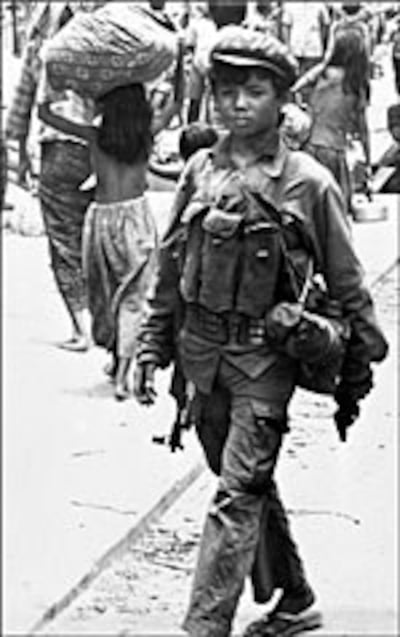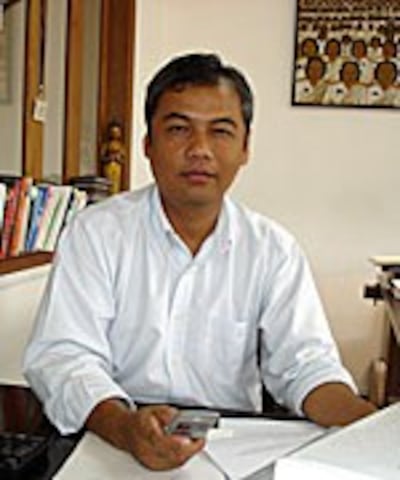Sixth in a series
Phnom Penh, Cambodia

Reporters covering the war in Cambodia faced many challenges, including physical danger and difficulties in gaining access to constantly changing front lines.
Refugees streaming out of Khmer Rouge-held villages in 1973 described the cruelty of the Khmer Rouge. But what motivated their leaders? And what motivated the Khmer Rouge soldiers, many of whom were in their early teens?
Neither side in the war appeared to be taking prisoners, and we saw few Khmer Rouge defectors. During the war in Vietnam, reporters got occasional access to North Vietnamese and Viet Cong prisoners and extensive access to defectors and captured documents.
I once even crossed the line with a colleague to talk with soldiers from the other side during a ceasefire in Vietnam.
But in Cambodia I saw only one small group of Khmer Rouge defectors and a single prisoner with his arms tied behind his back. I doubt that the prisoner or many of the defectors survived the war.
In contrast with Vietnam, where we had some knowledge of the Communist Party leaders and their ideology, the Khmer Rouge leaders were a mystery.
The Khmer Rouge, or Red Khmer, were so secretive that we weren’t sure who their number one leader was until a year or so after the war ended.
Khmer Rouge soldiers had been indoctrinated to believe in a mysterious ruling entity known as “Angkar,” meaning “the organization.”
According to the historian David P. Chandler, when the Khmer Rouge finally took Phnom Penh on April 17, 1975, “to onlookers crowding the streets to welcome them, the Red Khmer seemed to come from another planet.”
“The dark-skinned, silent, heavily armed soldiers, many of them only 12 or 13 years old, were a strange sight on April 17,” Chandler said in a Khmer Rouge history series prepared for Radio Free Asia.
“People in the capital were also surprised at the hatred that the Khmer Rouge soldiers showed toward them and the city as a whole,” said Chandler.

The soldiers were taught to believe that the city dwellers were “capitalists” who refused to join the revolution. They were instructed to show “class hatred” towards these “enemies.”
Within 24 hours, the young soldiers, acting on orders from above, began telling the people of Phnom Penh that they must immediately evacuate the city. They claimed that Phnom Penh would be bombed. This was a lie, but within three days the entire city was emptied.
According to Chandler’s account, more than 10,000 hospital patients, many of them severely wounded government soldiers, were forced to leave the city along with the others. The number of deaths that occurred along the roads leading away from the city, in some of the hottest days of the year, may have exceeded 20,000.
Loung Ung, author of the book First They Killed My Father, was a five-year-old child when she and her family were forced to evacuate Phnom Penh. She was sent to a work camp for orphans. Both her father and mother were executed as "class enemies."
Ung was taught to hate the Vietnamese, who became enemy number one after the Khmer Rouge took power. Child soldiers were taught to “follow orders without hesitation,” according to Ung, even to the point of shooting and killing their own “traitor parents” if necessary.
Hatred and fear sustained by relentless propaganda certainly helped to create these child soldiers and desensitize them to violence.
And even today, fear persists among both the survivors and their erstwhile tormentors, the Khmer Rouge.
On July 3, genocide-tribunal judges and prosecutors attended a swearing-in ceremony in Phnom Penh. A week later, prosecutors began collecting evidence against those deemed responsible for atrocities committed under the Khmer Rouge.
Former Khmer Rouge prison guards along with other former regime cadres worry that they might be put on trial along with top Khmer Rouge leaders, says Youk Chhang, director of the Documentation Center of Cambodia. Some potential witnesses have even gone into hiding.
Youk Chhang has called for a protection program both for victims and for lower-level perpetrators. This, he says, is his most serious concern for the pre-trial period.
